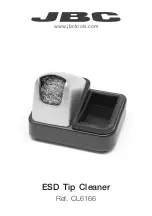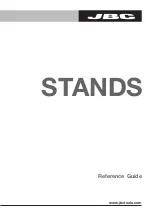
4
en
e) Do not overreach. Keep proper footing
and balance at all times.
This enables
better control of the power tool in
unexpected situations.
f) Dress properly. Do not wear loose cloth-
ing or jewelery. Keep your hair, clothing
and gloves away from moving parts.
Loose clothes, jewelry or long hair can
be caught in moving parts.
g) If devices are provided for the connec-
tion of dust extraction and collection
facilities, ensure these are connected
and properly used.
Use of dust collec-
tion can reduce dust-related hazards.
4) Power tool use and care
a) Do not force the power tool. Use the cor-
rect power tool for your application.
The
correct power tool will do the job bet-
ter and safer at the rate for which it was
designed.
b) Do not use the power tool if the switch
does not turn it on and off.
Any power
tool that cannot be controlled with the
switch is dangerous and must be
repaired.
c) Disconnect the plug from the power
source and/or the battery pack from the
power tool before making any adjust-
ments, changing accessories, or storing
power tools.
Such preventive safety
measures reduce the risk of starting the
power tool accidentally.
d) Store idle power tools out of the reach of
children and do not allow persons unfa-
miliar with the power tool or these
instructions to operate the power tool.
Power tools are dangerous in the hands
of untrained users.
e) Maintain power tools. Check for misalign-
ment or binding of moving parts, break-
age of parts and any other condition that
may affect the power tool’s operation. If
damaged, have the power tool repaired
before use.
Many accidents are caused by
poorly maintained power tools.
f) Keep cutting tools sharp and clean.
Properly maintained cutting tools with
sharp cutting edges are less likely to
bind and are easier to control.
g) Use the power tool, accessories and tool
bits etc. in accordance with these
instructions, taking into account the
working conditions and the work to be
performed.
Use of the power tool for
operations different from those
intended could result in a hazardous sit-
uation.
5) Service
a) Have your power tool serviced by a qual-
ified repair person using only identical
replacement parts.
This will ensure that
the safety of the power tool is main-
tained.
Special safety instructions.
Wear protective equipment. Depending on the
application, wear face shield or safety gog-
gles. Wear hearing protection.
The safety
glasses/goggles must be suitable to protect
against the particles emitted from different
operations. Continuous high exposure to
noise can lead to loss of hearing.
Replace the protective cable bushing immedi-
ately when damaged.
A defective protective
cable bushing can lead to overheating of the
machine and to an emergency stop.
Mount the swarf protector to the machine
before beginning to work.
Secure the power tool with the safety strap
supplied at all times, especially for work car-
ried out at elevated heights, when drilling hor-
izontally or above the head.
If there is a power
loss, or the power plug is pulled out, the mag-
netic holding power is not maintained.
When working overhead or on vertical sur-
faces, the coolant container must not be used.
Use Fein Cutting Paste instead. Liquids pene-
trating your electric power tool maycause
electric shock.
Avoid touching the drilled core that is auto-
matically ejected by the pilot pin when the
working procedure is finished.
Contact with
the core when it is hot, or if it falls, can cause
personal injuries.
Operate the power tool only from grounded
contact sockets that comply with the specifi-
cations. Do not use any connection cables
that are damaged; use extension cables with
a grounded contact that are checked at regu-
lar intervals.
A ground conductor without
continuity can cause an electric shock.
OBJ_BUCH-0000000142-002.book Page 4 Monday, November 18, 2013 11:13 AM





































